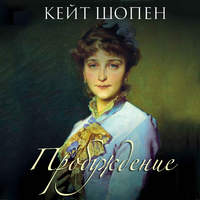
Полная версия
The Awakening
“Oh, enough, Robert!” she broke into his heated outburst. “You are not thinking of what you are saying. You speak with about as little reflection as we might expect from one of those children down there playing in the sand. If your attentions to any married women here were ever offered with any intention of being convincing, you would not be the gentleman we all know you to be, and you would be unfit to associate with the wives and daughters of the people who trust you.”
Madame Ratignolle had spoken what she believed to be the law and the gospel. The young man shrugged his shoulders impatiently.
“Oh! well! That isn’t it,” slamming his hat down vehemently upon his head. “You ought to feel that such things are not flattering to say to a fellow.”
“Should our whole intercourse consist of an exchange of compliments? Ma foil!”
“It isn’t pleasant to have a woman tell you—” he went on, unheedingly, but breaking off suddenly: “Now if I were like Arobin—you remember Alcée Arobin and that story of the consul’s wife at Biloxi?” And he related the story of Alcée Arobin and the consul’s wife, and another about the tenor of the French Opera, who received letters which should never have been written, and still other stories, grave and gay, till Mrs. Pontellier and her possible propensity for taking young men seriously was apparently forgotten.
Madame Ratignolle, when they had regained her cottage, went in to take the hour’s rest which she considered helpful. Before leaving her, Robert begged her pardon for the impatience—he called it rudeness—with which he had received her well-meant caution.
“You made one mistake, Adèle,” he said, with a light smile; “there is no earthly possibility of Mrs. Pontellier ever taking me seriously. You should have warned me against taking myself seriously. Your advice might then have carried some weight and given me subject for some reflection. Au revoir. But you look tired,” he added, solicitously. “Would you like a cup of bouillon? Shall I stir you a toddy? Let me mix you a toddy with a drop of Angostura.”
She acceded to the suggestion of bouillon, which was grateful and acceptable. He went himself to the kitchen, which was a building apart from the cottages and lying to the rear of the house. And he himself brought her the golden-brown bouillon, in a dainty Sèvres cup, with a flaky cracker or two on the saucer.
She thrust a bare, white arm from the curtain which shielded her open door, and received the cup from his hands. She told him he was a bon garçon, and she meant it. Robert thanked her and turned away toward “the house.”
The lovers were just entering the grounds of the pension. They were leaning toward each other as the water oaks bent from the sea. There was not a particle of earth beneath their feet. Their heads might have been turned upside down, so absolutely did they tread upon blue ether. The lady in black, creeping behind them, looked a trifle paler and more jaded than usual. There was no sign of Mrs. Pontellier and the children. Robert scanned the distance for any such apparition. They would doubtless remain away till the dinner hour. The young man ascended to his mother’s room. It was situated at the top of the house, made up of odd angles and a queer, sloping ceiling. Two broad dormer windows looked out toward the Gulf, and as far across it as a man’s eye might reach. The furnishings of the room were light, cool, and practical.
Madame Lebrun was busily engaged at the sewing machine. A little black girl sat on the floor, and with her hands worked the treadle of the machine. The Creole woman does not take any chances which may be avoided of imperiling her health.
Robert went over and seated himself on the broad sill of one of the dormer windows. He took a book from his pocket and began energetically to read it, judging by the precision and frequency with which he turned the leaves. The sewing machine made a resounding clatter in the room; it was of a ponderous, bygone make. In the lulls, Robert and his mother exchanged bits of desultory conversation.
“Where is Mrs. Pontellier?”
“Down at the beach with the children.”
“I promised to lend her the Goncourt. Don’t forget to take it down when you go; it’s there on the bookshelf over the small table.” Clatter, clatter, clatter, bang! for the next five or eight minutes.
“Where is Victor going with the rockaway?”
“The rockaway? Victor?”
“Yes, down there in front. He seems to be getting ready to drive away somewhere.”
“Call him.” Clatter, clatter!
Robert uttered a shrill, piercing whistle which might have been heard back at the wharf.
“He won’t look up.”
Madame Lebrun flew to the window. She called “Victor!” She waved a handkerchief and called again. The young fellow below got into the vehicle and started the horse off at a gallop.
Madame Lebrun went back to the machine, crimson with annoyance. Victor was the younger son and brother—a tête montée, with a temper which invited violence and a will which no ax could break.
“Whenever you say the word I’m ready to thrash any amount of reason into him that he’s able to hold.”
“If your father had only lived!” Clatter, clatter, clatter, clatter, bang! It was a fixed belief with Madame Lebrun that the conduct of the universe and all things pertaining thereto would have been manifestly of a more intelligent and higher order had not Monsieur Lebrun been removed to other spheres during the early years of their married life.
“What do you hear from Montel?” Montel was a middle-aged gentleman whose vain ambition and desire for the past twenty years had been to fill the void which Monsieur Lebrun’s taking off had left in the Lebrun household. Clatter, clatter, bang, clatter!
“I have a letter somewhere,” looking in the machine drawer and finding the letter in the bottom of the workbasket. “He says to tell you he will be in Vera Cruz the beginning of next month”—clatter, clatter!—“and if you still have the intention of joining him”—bang! clatter, clatter, bang!
“Why didn’t you tell me so before, mother? You know I wanted—” Clatter, clatter, clatter!
“Do you see Mrs. Pontellier starting back with the children? She will be in late to luncheon again. She never starts to get ready for luncheon till the last minute.” Clatter, clatter! “Where are you going?”
“Where did you say the Goncourt was?”
CHAPTER 9
Every light in the hall was ablaze, every lamp turned as high as it could be without smoking the chimney or threatening explosion. The lamps were fixed at intervals against the wall, encircling the whole room. Some one had gathered orange and lemon branches, and with these fashioned graceful festoons between. The dark green of the branches stood out and glistened against the white muslin curtains which draped the windows, and which puffed, floated, and flapped at the capricious will of a stiff breeze that swept up from the Gulf.
It was Saturday night a few weeks after the intimate conversation held between Robert and Madame Ratignolle on their way from the beach. An unusual number of husbands, fathers, and friends had come down to stay over Sunday, and they were being suitably entertained by their families, with the material help of Madame Lebrun. The dining tables had all been removed to one end of the hall, and the chairs ranged about in rows and in clusters. Each little family group had had its say and exchanged its domestic gossip earlier in the evening. There was now an apparent disposition to relax, to widen the circle of confidences and give a more general tone to the conversation.
Many of the children had been permitted to sit up beyond their usual bedtime. A small band of them were lying on their stomachs on the floor looking at the colored sheets of the comic papers which Mr. Pontellier had brought down. The little Pontellier boys were permitting them to do so, and making their authority felt.
Music, dancing, and a recitation or two were the entertainments furnished, or rather, offered. But there was nothing systematic about the programme, no appearance of prearrangement nor even premeditation.
At an early hour in the evening the Farival twins were prevailed upon to play the piano. They were girls of fourteen, always clad in the Virgin’s colors, blue and white, having been dedicated to the Blessed Virgin at their baptism. They played a duet from “Zampa,” and at the earnest solicitation of everyone present followed it with the overture to “The Poet and the Peasant.”
“Allez vous-en! Sapristi!” shrieked the parrot outside the door. He was the only being present who possessed sufficient candor to admit that he was not listening to these gracious performances for the first time that summer. Old Monsieur Farival, grandfather of the twins, grew indignant over the interruption, and insisted upon having the bird removed and consigned to regions of darkness. Victor Lebrun objected, and his decrees were as immutable as those of Fate. The parrot fortunately offered no further interruption to the entertainment, the whole venom of his nature apparently having been cherished up and hurled against the twins in that one impetuous outburst.
Later a young brother and sister gave recitations, which everyone present had heard many times at winter evening entertainments in the city.
A little girl performed a skirt dance in the center of the floor. The mother played her accompaniments and at the same time watched her daughter with greedy admiration and nervous apprehension. She need have had no apprehension. The child was mistress of the situation. She had been properly dressed for the occasion in black tulle and black silk tights. Her little neck and arms were bare, and her hair, artificially crimped, stood out like fluffy black plumes over her head. Her poses were full of grace, and her little black-shod toes twinkled as they shot out and upward with a rapidity and suddenness which were bewildering.
But there was no reason why everyone should not dance. Madame Ratignolle could not, so it was she who gaily consented to play for the others. She played very well, keeping excellent waltz time and infusing an expression into the strains which was indeed inspiring. She was keeping up her music on account of the children, she said, because she and her husband both considered it a means of brightening the home and making it attractive.
Almost everyone danced but the twins, who could not be induced to separate during the brief period when one or the other should be whirling around the room in the arms of a man. They might have danced together, but they did not think of it.
The children were sent to bed. Some went submissively; others with shrieks and protests as they were dragged away. They had been permitted to sit up till after the ice cream, which naturally marked the limit of human indulgence.
The ice cream was passed around with cake—gold and silver cake arranged on platters in alternate slices; it had been made and frozen during the afternoon back of the kitchen by two black women, under the supervision of Victor. It was pronounced a great success—excellent if it had only contained a little less vanilla or a little more sugar, if it had been frozen a degree harder, and if the salt might have been kept out of portions of it. Victor was proud of his achievement, and went about recommending it and urging everyone to partake of it to excess.
After Mrs. Pontellier had danced twice with her husband, once with Robert, and once with Monsieur Ratignolle, who was thin and tall and swayed like a reed in the wind when he danced, she went out on the gallery and seated herself on the low window sill, where she commanded a view of all that went on in the hall and could look out toward the Gulf. There was a soft effulgence in the east. The moon was coming up, and its mystic shimmer was casting a million lights across the distant, restless water.
“Would you like to hear Mademoiselle Reisz play?” asked Robert, coming out on the porch where she was. Of course Edna would like to hear Mademoiselle Reisz play; but she feared it would be useless to entreat her.
“I’ll ask her,” he said. “I’ll tell her that you want to hear her. She likes you. She will come.” He turned and hurried away to one of the far cottages, where Mademoiselle Reisz was shuffling away. She was dragging a chair in and out of her room, and at intervals objecting to the crying of a baby, which a nurse in the adjoining cottage was endeavoring to put to sleep. She was a disagreeable little woman, no longer young, who had quarreled with almost everyone, owing to a temper which was self-assertive and a disposition to trample upon the rights of others. Robert prevailed upon her without any too great difficulty.
She entered the hall with him during a lull in the dance. She made an awkward, imperious little bow as she went in. She was a homely woman, with a small weazened face and body and eyes that glowed. She had absolutely no taste in dress, and wore a batch of rusty black lace with a bunch of artificial violets pinned to the side of her hair.
“Ask Mrs. Pontellier what she would like to hear me play,” she requested of Robert. She sat perfectly still before the piano, not touching the keys, while Robert carried her message to Edna at the window. A general air of surprise and genuine satisfaction fell upon everyone as they saw the pianist enter. There was a settling down, and a prevailing air of expectancy everywhere. Edna was a trifle embarrassed at being thus signaled out for the imperious little woman’s favor. She would not dare to choose, and begged that Mademoiselle Reisz would please herself in her selections.
Edna was what she herself called very fond of music. Musical strains, well rendered, had a way of evoking pictures in her mind. She sometimes liked to sit in the room of mornings when Madame Ratignolle played or practiced. One piece which that lady played Edna had entitled “Solitude.” It was a short, plaintive, minor strain. The name of the piece was something else, but she called it “Solitude.” When she heard it there came before her imagination the figure of a man standing beside a desolate rock on the seashore. He was naked. His attitude was one of hopeless resignation as he looked toward a distant bird winging its flight away from him.
Another piece called to her mind a dainty young woman clad in an Empire gown, taking mincing dancing steps as she came down a long avenue between tall hedges. Again, another reminded her of children at play, and still another of nothing on earth but a demure lady stroking a cat.
The very first chords which Mademoiselle Reisz struck upon the piano sent a keen tremor down Mrs. Pontellier’s spinal column. It was not the first time she had heard an artist at the piano. Perhaps it was the first time she was ready, perhaps the first time her being was tempered to take an impress of the abiding truth.
She waited for the material pictures which she thought would gather and blaze before her imagination. She waited in vain. She saw no pictures of solitude, of hope, of longing, or of despair. But the very passions themselves were aroused within her soul, swaying it, lashing it, as the waves daily beat upon her splendid body. She trembled, she was choking, and the tears blinded her.
Mademoiselle had finished. She arose, and bowing her stiff, lofty bow, she went away, stopping for neither thanks nor applause. As she passed along the gallery she patted Edna upon the shoulder.
“Well, how did you like my music?” she asked. The young woman was unable to answer; she pressed the hand of the pianist convulsively. Mademoiselle Reisz perceived her agitation and even her tears. She patted her again upon the shoulder as she said:
“You are the only one worth playing for. Those others? Bah!” and she went shuffling and sidling on down the gallery toward her room.
But she was mistaken about “those others.” Her playing had aroused a fever of enthusiasm. “What passion!” “What an artist!” “I have always said no one could play Chopin like Mademoiselle Reisz!” “That last prelude! Bon Dieu! It shakes a man!”
It was growing late, and there was a general disposition to disband. But some one, perhaps it was Robert, thought of a bath at that mystic hour and under that mystic moon.
CHAPTER 10
At all events Robert proposed it, and there was not a dissenting voice. There was not one but was ready to follow when he led the way. He did not lead the way, however, he directed the way; and he himself loitered behind with the lovers, who had betrayed a disposition to linger and hold themselves apart. He walked between them, whether with malicious or mischievous intent was not wholly clear, even to himself.
The Pontelliers and Ratignolles walked ahead; the women leaning upon the arms of their husbands. Edna could hear Robert’s voice behind them, and could sometimes hear what he said. She wondered why he did not join them. It was unlike him not to. Of late he had sometimes held away from her for an entire day, redoubling his devotion upon the next and the next, as though to make up for hours that had been lost. She missed him the days when some pretext served to take him away from her, just as one misses the sun on a cloudy day without having thought much about the sun when it was shining.
The people walked in little groups toward the beach. They talked and laughed; some of them sang. There was a band playing down at Klein’s hotel, and the strains reached them faintly, tempered by the distance. There were strange, rare odors abroad—a tangle of the sea smell and of weeds and damp, new-plowed earth, mingled with the heavy perfume of a field of white blossoms somewhere near. But the night sat lightly upon the sea and the land. There was no weight of darkness; there were no shadows. The white light of the moon had fallen upon the world like the mystery and the softness of sleep.
Most of them walked into the water as though into a native element. The sea was quiet now, and swelled lazily in broad billows that melted into one another and did not break except upon the beach in little foamy crests that coiled back like slow, white serpents.
Edna had attempted all summer to learn to swim. She had received instructions from both the men and women, in some instances from the children. Robert had pursued a system of lessons almost daily, and he was nearly at the point of discouragement in realizing the futility of his efforts. A certain ungovernable dread hung about her when in the water, unless there was a hand near by that might reach out and reassure her.
But that night she was like the little tottering, stumbling, clutching child, who of a sudden realizes its powers, and walks for the first time alone, boldly and with overconfidence. She could have shouted for joy. She did shout for joy, as with a sweeping stroke or two she lifted her body to the surface of the water.
A feeling of exultation overtook her, as if some power of significant import had been given her to control the working of her body and her soul. She grew daring and reckless, overestimating her strength. She wanted to swim far out, where no woman had swum before.
Her unlooked-for achievement was the subject of wonder, applause, and admiration. Each one congratulated himself that his special teachings had accomplished this desired end.
“How easy it is!” she thought. “It is nothing,” she said aloud; “why did I not discover before that it was nothing. Think of the time I have lost splashing about like a baby!” She would not join the groups in their sports and bouts, but intoxicated with her newly conquered power, she swam out alone.
She turned her face seaward to gather in an impression of space and solitude, which the vast expanse of water, meeting and melting with the moonlit sky, conveyed to her excited fancy. As she swam she seemed to be reaching out for the unlimited in which to lose herself.
Once she turned and looked toward the shore, toward the people she had left there. She had not gone any great distance—that is, what would have been a great distance for an experienced swimmer. But to her unaccustomed vision the stretch of water behind her assumed the aspect of a barrier which her unaided strength would never be able to overcome.
A quick vision of death smote her soul, and for a second of time appalled and enfeebled her senses. But by an effort she rallied her staggering faculties and managed to regain the land.
She made no mention of her encounter with death and her flash of terror, except to say to her husband, “I thought I should have perished out there alone.”
“You were not so very far, my dear; I was watching you,” he told her.
Edna went at once to the bath-house, and she had put on her dry clothes and was ready to return home before the others had left the water. She started to walk away alone. They all called to her and shouted to her. She waved a dissenting hand, and went on, paying no further heed to their renewed cries which sought to detain her.
“Sometimes I am tempted to think that Mrs. Pontellier is capricious,” said Madame Lebrun, who was amusing herself immensely and feared that Edna’s abrupt departure might put an end to the pleasure.
“I know she is,” assented Mr. Pontellier, “sometimes, not often.”
Edna had not traversed a quarter of the distance on her way home before she was overtaken by Robert.
“Did you think I was afraid?” she asked him, without a shade of annoyance.
“No; I knew you weren’t afraid.”
“Then why did you come? Why didn’t you stay out there with the others?”
“I never thought of it.”
“Thought of what?”
“Of anything. What difference does it make?”
“I’m very tired,” she uttered, complainingly.
“I know you are.”
“You don’t know anything about it. Why should you know? I never was so exhausted in my life. But it isn’t unpleasant. A thousand emotions have swept through me to-night. I don’t comprehend half of them. Don’t mind what I’m saying; I am just thinking aloud. I wonder if I shall ever be stirred again as Mademoiselle Reisz’s playing moved me tonight. I wonder if any night on earth will ever again be like this one. It is like a night in a dream. The people about me are like some uncanny, half-human beings. There must be spirits abroad tonight.”
“There are,” whispered Robert. “Didn’t you know this was the twenty-eighth of August?”
“The twenty-eighth of August?”
“Yes. On the twenty-eighth of August, at the hour of midnight, and if the moon is shining—the moon must be shining—a spirit that has haunted these shores for ages rises up from the Gulf. With its own penetrating vision the spirit seeks some one mortal worthy to hold him company, worthy of being exalted for a few hours into realms of the semicelestials. His search has always hitherto been fruitless, and he has sunk back, disheartened, into the sea. But tonight he found Mrs. Pontellier. Perhaps he will never wholly release her from the spell. Perhaps she will never again suffer a poor, unworthy earthling to walk in the shadow of her divine presence.”
“Don’t banter me,” she said, wounded at what appeared to be his flippancy. He did not mind the entreaty, but the tone with its delicate note of pathos was like a reproach. He could not explain; he could not tell her that he had penetrated her mood and understood. He said nothing except to offer her his arm, for, by her own admission, she was exhausted. She had been walking alone with her arms hanging limp, letting her white skirts trail along the dewy path. She took his arm, but she did not lean upon it. She let her hand lie listlessly, as though her thoughts were elsewhere—somewhere in advance of her body, and she was striving to overtake them.
Robert assisted her into the hammock which swung from the post before her door out to the trunk of a tree.
“Will you stay out here and wait for Mr. Pontellier?” he asked.
“I’ll stay out here. Goodnight.”
“Shall I get you a pillow?”
“There’s one here,” she said, feeling about, for they were in the shadow.









